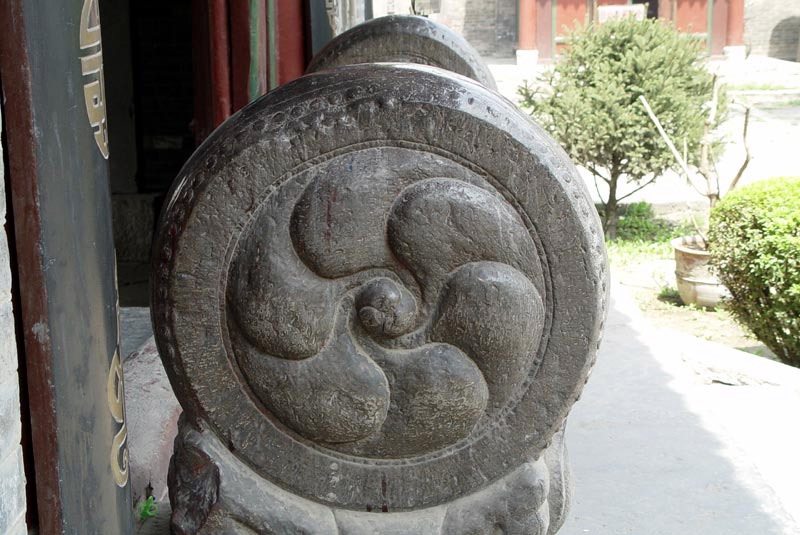
Photo by Jim Gourley
With his wide, simple face on his squat, chubby frame, Billy the big-boned knife-thrower wishes he were invisible or, at least, that people would not look. For this wish, Billy has learned he is in the wrong job. The yellow-red tent goes up in market town after market town, and every night he peers out ashamed at the gallery of new faces. All the children, he thinks, God help me if a knife should slip.
Billy doesn't realize these children, sons and daughters of sturdy farmers, have seen all of life by their eighth birthday: birth, afterbirth, mating, the slaughter. For them, the circus is a diversion, a chance to get a sticky-fingered sugar rush. Billy, who lives in a caravan drawn by pensionable horses, has all this to learn. He believes it really matters.
When Irena makes a midnight flit with the sword swallower, Billy almost learns misery. He throws his knives at the empty wheel; he chalk marks her outline, cruelly exaggerating her hips, her thighs. At his lowest, he ties four courgettes to a flour sack, attaches a cabbage on which he has drawn an ugly wide-mouthed face, and throws at it blindfolded. He is horrified to see the knife between the cabbage's bulbous eyes.
But his lowest gets lower; being off-stage is surprisingly painful. He eats with the labourers, the flatulence of the dwarf who mucks out the animals turning his stomach. He dips his bread in the stew and grunts along with the others. He throws at the empty wheel, knowing he will not be in the show, and kicks at the sawdust. When the ringmaster cracks his whip over Billy's head, stinging the air, Billy's first reaction is to stay put and watch the dwarf peel off another yellow toenail. But no; he has learned boredom and wants no more.
The circus master introduces him to Katrina, and Billy wants to weep. The blonde hair, those eyes, Jesus Christ those eyes! He learns about Katrina: the lilt in her voice, an eastern accent he heard maybe three hundred miles south during the rainy June. He learns how she curtseys when he enters the tent; how, when she giggles, she folds three of her fingers to her mouth and shows a flash of tooth. His hand trembles as he ties her to the wheel. "I trust you," she says, and closes her eyes. He throws perfectly, the knives thudding into the wheel in five perfect points of the pentagram. At night they eat together; Katrina takes quick, small mouthfuls, and Billy pushes the vegetables around his plate, watching her.
They are back in the show. When she takes a graceful bow, applause fill the tent, and when she holds his hand aloft, Billy bows—an awkward, graceless bow, but when he hears the whistles, he cannot help himself and bows again. He wears the spotlight like an old smart coat. Katrina comes to his caravan, sits on the edge of his bed. They drink, and Billy looks at her glittering dress, the bare shoulder—the long, graceful neck he longs to press his lips against. Katrina talks about her life before the circus—her sister, how they used to ski down the mountain under moonlight. Her brother, off to study law and make her father proud. Billy says little. He is a good knife thrower. He cannot remember how he found out.
They sit together in silence. They have no need to speak, Billy learns. They can just be.
North fifty miles, fifty more, fifty more, and the applause louder every time. He begins to dream of what could be. Short on dinner, he holds his trousers up with a belt she has woven for him.
In the new town, as they parade before the tent and look the new crowd over, Billy sees Katrina talking to a man queueing to pay. Billy stares. She is laughing. He is handsome, Billy thinks, watching him bare his teeth and tip his head back, laughing with her. Katrina looks across to Billy, and back again. There is more laughter, sharp in Billy's gut.
Her brother, he thinks. Her brother.
"Your brother?"
She shakes her head. "No, but he reminds me of someone."
Billy is shaking. He can barely hold the knives. From the dark at the back of the tent, he finds the man—third row, near the gangway. surrounded by squealing children. Billy looks at the smug parents, the sickly red-faced children, and grips the knife handle until his knuckles are bled white. "Tonight, we do eight," he tells Katrina, who nods. She asks him if he is all right, and he tightens his belt and nods to let her know he isn't.
He marches out ahead of her, and as he ties her to the wheel he sees her look to the left, into the crowd, the glitter in her makeup catching the light. She smiles. How he hates her.
The drum roll. Billy unwraps the eight knives and lays them on the table beside him. The wheel begins to spin. Billy lifts the first knife and waits, holding the audience, making them wait—then, in a blur of motion, he sends it flying into the wood precisely between her ankles. The audience have no time to react before the second, third, fourth, fifth whistle from his hand and into the same spot in the wood, and their gasps get louder as the final three knives reach their target. Before the applause begins, Billy turns and walks out of the spotlight, out of the tent. He is halfway down the road on his worn old horse before Katrina is untied, and it is then, once the wheel comes to rest, she sees the knives form the shape of a clumsy heart.
And so it is that Billy learns about love.